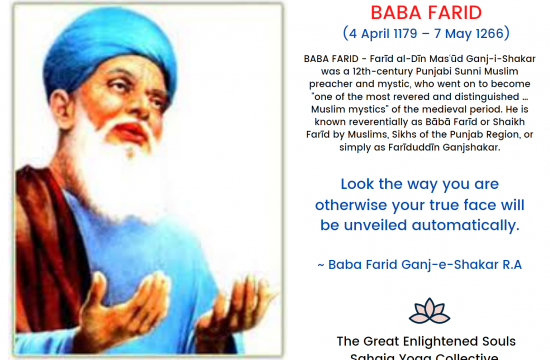“I must find a master, I must test him, I must drink water after straining it.” Preoccupied with these thoughts, Bulleh Shah combed Lahore for a master. One day he passed the garden of Shah Inayat and couldn’t resist the sight of golden ripe mangoes. He invoked the name of God and the mangoes fell on the ground.
Shah Inayat who was watching from a distance, demanded the mangoes be returned.
Bulleh Shah protested, “I did not break the mangoes.”
Shah Inayat reprimanded, “You stole the mangoes. By invoking the name of God, you got the mangoes.”
Bulleh Shah found his master in the gardner and fell at his feet,, “How to curb my mind?”
Shah Inayat smiled, “O Bulleh what of the mind? Uproot it from here and plant it there. It is simple as detaching one’s mind from the world outside and attaching it to the spirit within. It is just the shifting of attention. The power of love of God Almighty is all pervading but you are so wrapped up in your ego you do not feel the power of His love.
“Who do you sit behind the screen and peep?
From whom do you hide yourself?
O Bulleh, make your body a furnace;
Burn your bones to ash in its blaze.
Turn it into a vessel of love;
Thus alone, can you behold the creator?”
For a brilliant scholar like Bulleh Shah who traced lineage to Prophet Mohammed, to accept a low caste gardner as a Master created an upheaval. But it did not deter Bulleh;
“Whatever colour I am dyed in
The dye is of deep colour;
It has the glow of my Master; O friend.”
The dye was so deeply cast that Bulleh Shah saw God in every colour. He sang of Rama, Krishna and Muhammad. He was too intoxicated to bother about heaven or hell and even rejected the Shariat.
“In shrines dwell robbers
In idol-horses, thugs
In mosques live vagabonds
The lovers of God remain aloof.”
“Mullahs and torch-bearers come from the same stock.
They give light to others and themselves are in the dark.”
“Paganism is for the pagan
And faith for the faithful
A bit of heartache is enough for Attar.
O Bulleh, unique is the love for the lord!
It does not blend with any other love.”
“Within us abides our Murshid (master)
When I fell in love, I learnt this.
O friend, I am lost to myself.”
“O Bulleh, what do I know who I am?
I am not among believers seen in mosques.
Nor am I versed in the traditions of unbelief.
I am not among the pious, nor among the sinful.”
“Repeating the name of the Beloved.
I have become the Beloved myself
Whom, shall I call the Beloved now?”
“In the rapture of your love I have lost my senses.
I have now found how close you and I are.
You, O Lord, are near the Royal Vein within me.”
After self-realization the spiritual energy called the Kundalini flows through a very fine vein and enlightens the attention. Bulleh Shah and other Sufi saints referred to it as the Shah Rag or the Royal Vein because it is the ruling vein (Sushumna nadi) of the spiritual energy, connecting all the chakras to the all- pervading power of Divine love;
“Those who are able to enter the Royal Vein do not find the court of the Lord, very far,” says Bulleh. Hafiz, a great Sufi mystic of Persia counsels seekers to raise attention from six lower centers to the seven skies to be able to hear the five Divine melodies ringing within him.

This is true knowledge but, “knowledge which does not take you to the destination of reality, only ends by aggravating your ignorance,” says Bulleh.
Bulleh had the insight of God and how the One became Many.
“I have now seen the fair Beloved,
Whose beauty shines through His creation.
When the One existed all alone,
No light of His was ever manifest.
Nor did God or His Prophets exist,
Nor the Omnipotent or the Dominant.
I have now seen the fair Beloved.”
The Grace and mercy of the Lord is central to a Sufi’s heart.
Says Bulleh Shah;
“If you were to dispense justice,
There is no place for me;
From Your Grace alone could I get a bounty.”
“Wake up O Bulleh! Go face the world,
Those you forgive, God will forgive you.”
In the strife torn Punjab of the eighteenth century or the world crisis today, Bulleh’s counsel resonates;
“You may break a Mosque,
You may break a temple,
break not a heart drenched in divine love…”
Bulleh Shah’s writings represent him as a humanist, someone providing solutions to the sociological problems of the world around him as he lives through it, describing the turbulence his motherland of Punjab is passing through, while concurrently searching for God. His poetry highlights his mystical spiritual voyage through the four stages of Sufism: Shariat (Path), Tariqat (Observance), Haqiqat (Truth) and Marfat (Union). The simplicity with which Bulleh Shah has been able to address the complex fundamental issues of life and humanity is a large part of his appeal. Thus, many people have put his kafis to music, from humble street-singers to renowned Sufi singers like the Waddali Brothers, Abida Parveen and Pathanay Khan, from the synthesized techno qawwali remixes of UK-based Asian artists to the rock band Junoon.
Bulleh Shah’s popularity stretches uniformly across Hindus, Sikhs and Muslims, to the point that much of the written material about this philosopher is from Hindu and Sikh authors.
Source: https://sufipoetry.wordpress.com/poets/bulleh-shah/





